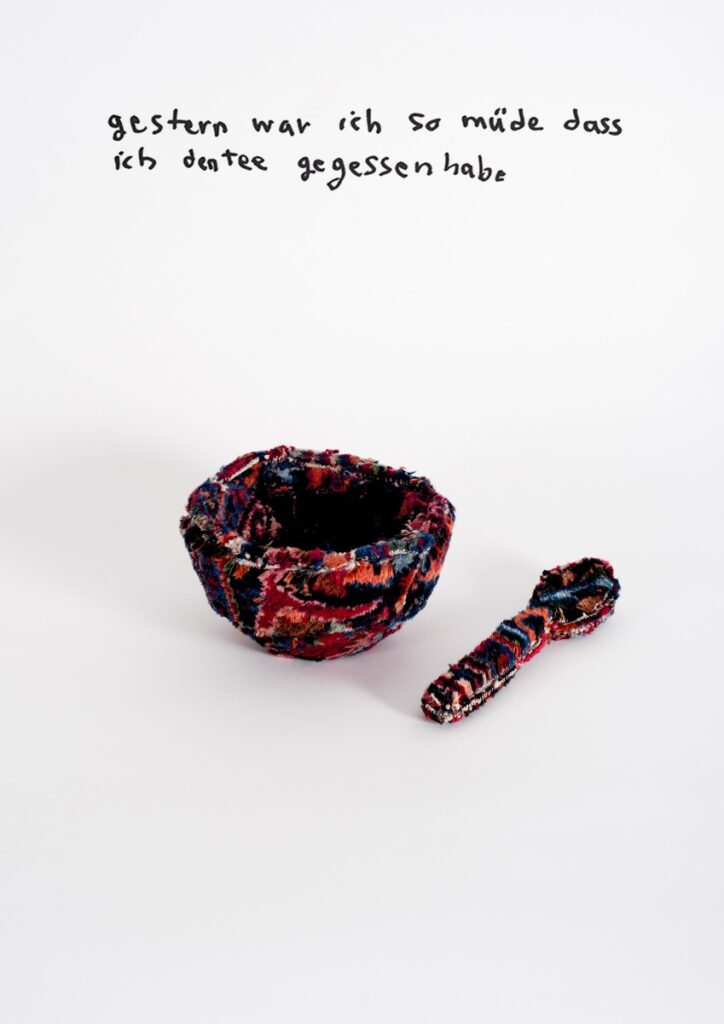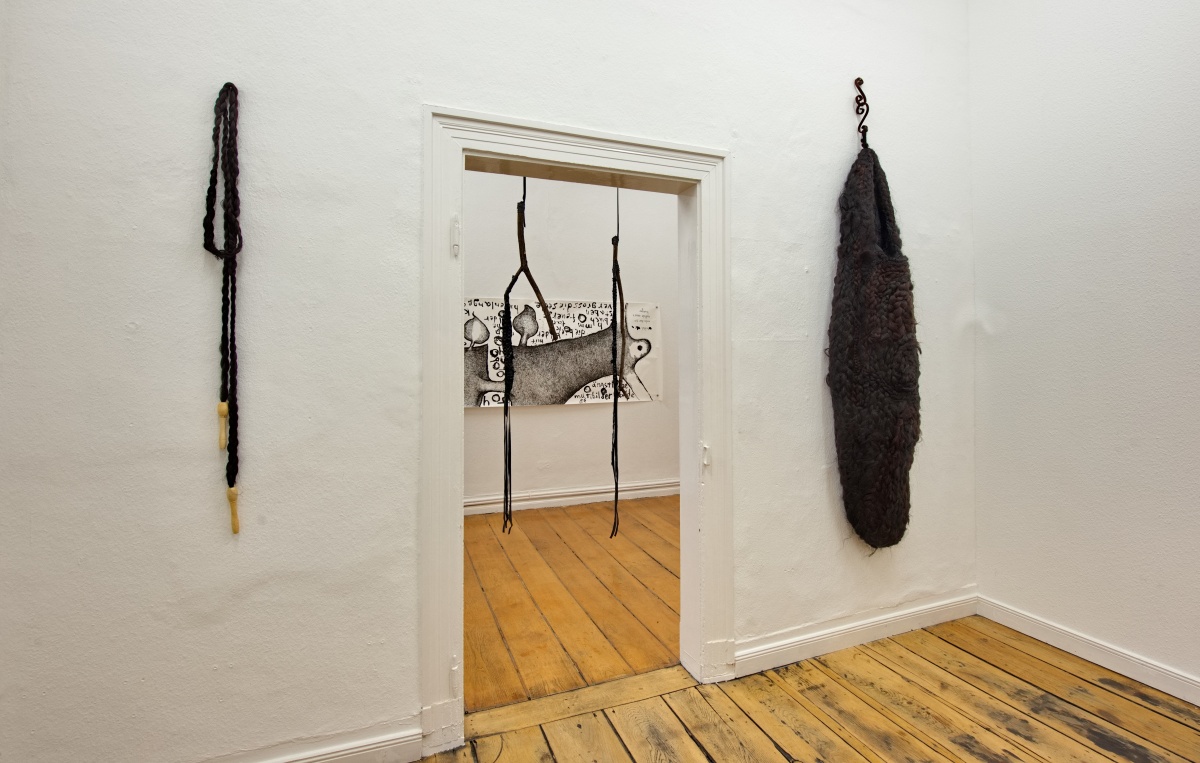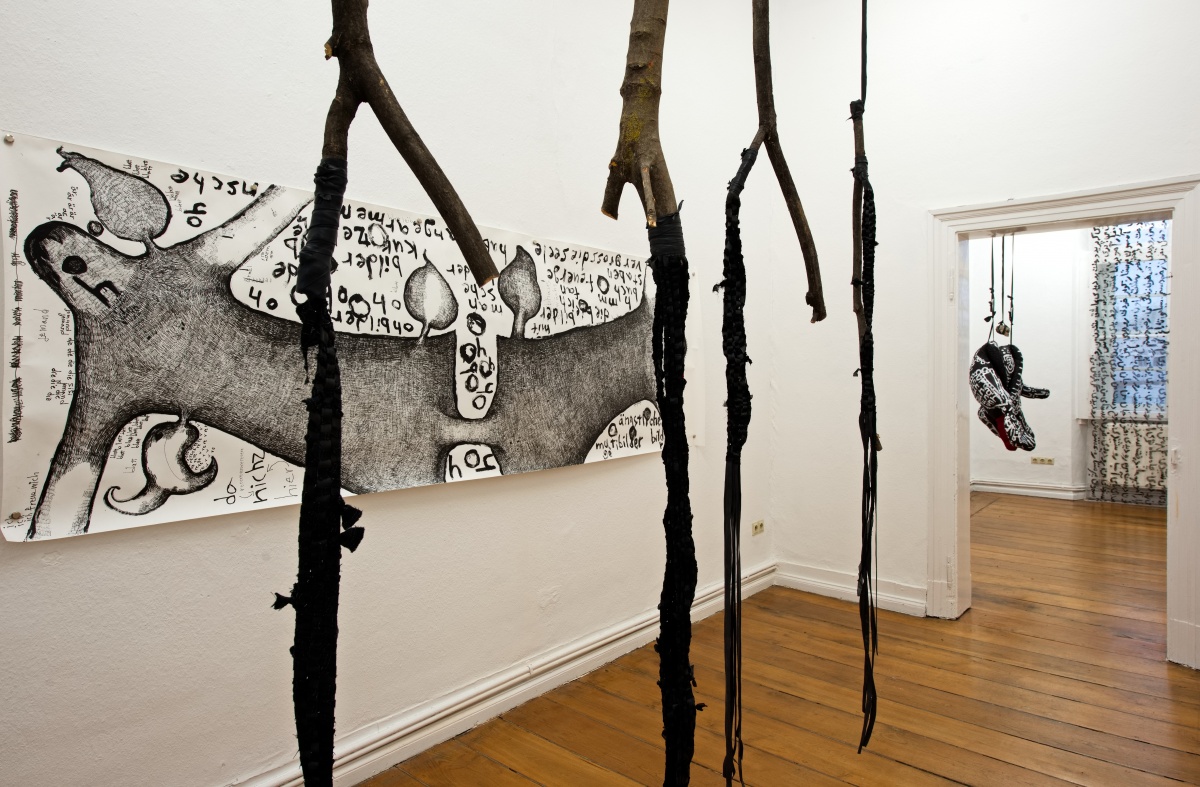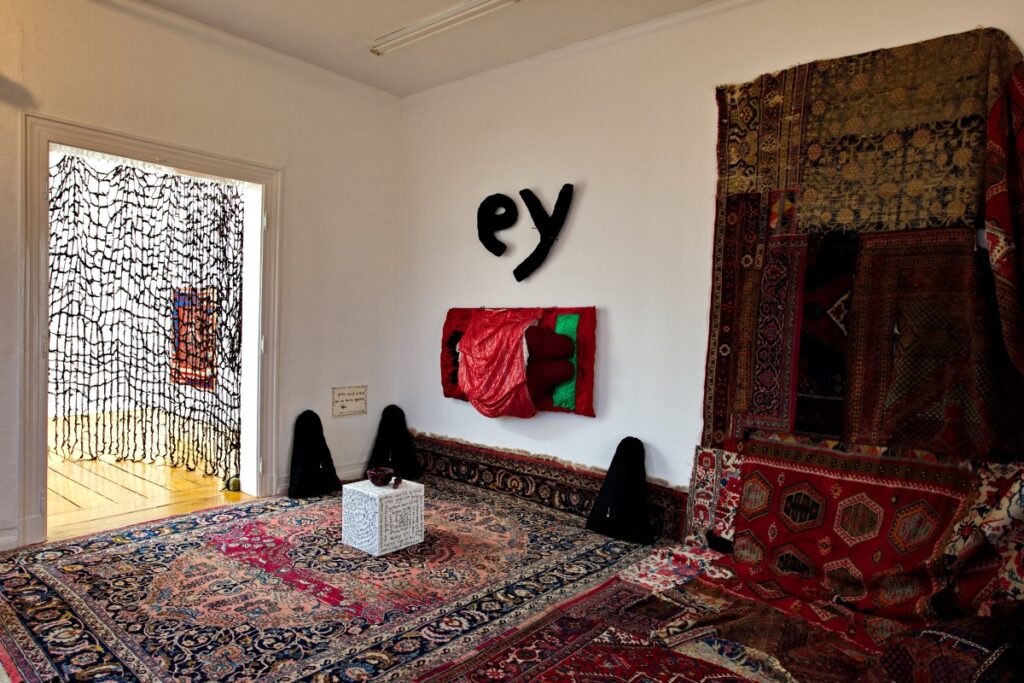Farkhondeh Shahroudi
gestern war ich so müde dass ich den tee gegessen habe
17. Februar – 16. April 2023

In the three-part project Das Theater in jedem von uns , 17.02 - 30.06.2023, Kunstverein Arnsberg explores and investigates how processes and spaces of theater are given a form in visual art and in our everyday life. The series begins with the solo exhibition of Farkhondeh Shahroudi gestern war ich so müde dass ich den tee gegessen habe (yesterday I was so tired that I ate the tea): a sculptural fabric of poetic, social and political texture. Farkhondeh Shahroudi‘s artworks are drawn from the intertwined relationships between writing and image, between bodies and narration. Inspired by the poetry and memories of Iran and her everyday life in Germany, her works relate to verbal language and speechlessness. They evoke the unspoken. Her work addresses translocated movements of people who are at the mercy of others, uprooted or dislocated, moving between places and worlds as if in a play.
Many figures in Shahroudi‘s work are reminiscent of traditional Iranian theater, “Ta‘ziyeh,” where actors, spectators, and animals blur into a single entity on the street. In this way, images, bodies, and narratives are transformed through her handwriting, through sewing and weaving with different materials, into a synthetic universe that oscillates between social and asocial, political and private, public and intimate, between the inside and the outside, between language and illegibility. gestern war ich so müde dass ich den tee gegessen habe is a solo exhibition that dares to look the shadows of everyday life in the eye. According to psychiatrist Carl Gustav Jung, a shadow is the sum of all the dark and especially repressed feelings that are hidden inside us. Shadows are all that we do not want to be, but at the same time often are. Shadows develop in every human being, starting already in childhood. The meaning of shadows differs depending on the culture in which one grows up. It belongs to life, just as light belongs to the day and darkness to the night. The eschatology of later Zoroastrianism, which originated in Western Iran, contains the widespread idea that humans cast no shadow when they arrive in the afterlife. For Farkhondeh Shahroudi, the carpet represents the ideal space, corresponding to an ancient symbolism, and in its completed coherence it assimilates in itself a part of paradise. In her sculptures and installations, these carpets evolve into mobile gardens, into heterotopic spaces: they have a different kind of spatiality that on the one hand releases the imagination and on the other gives form to that feeling of Not Belonging that is characteristic of the artist in exile.
Die Ausstellung im Kunstverein Arnsberg verbindet sowohl Malerei, Objekte und Fotografie aus den früheren Schaffungsjahren der Künstlerin, als auch ganz neu konzipierte Installationen und Zeichnungen. Die meisten Arbeiten werden erstmalig ausgestellt und in einer erzählerischen Ausstellungschoreografie gezeigt, die das Publikum dazu einlädt, in die vielschichtigen inneren Landschaften von Farkhondeh Shahroudis Werk einzutauchen.
Im Läufe der Ausstellung wird Shahroudi eine Performance im öffentlichen Raum entwickeln.
In dieser Performance, „sang zani“ (= Steine klopfen), werden das Publikum, und Stadtbewohnerinnen eingeladen , zu vorgegebenen Rhythmen zwei Steine aufeinander zu klopfen. Diese Klang-Prozession führt Shahroudi selbst, angekleidet mit einem performativen Kleid, “von weinenden Bäumen“ aus Kautschuk Reifen, auf.
„sang zani“ ist eine performative Adaption der schiitischen Trauerzeremonie „daste gardani“ und der Tradition des iranischen Theaters „ta’ziyeh“, bei dem die Menschen versammelt werden, um Ungerechtigkeiten zu beklagen.
Die Performance wird zur Finissage am 16.4.2023 aufgeführt.
Farkhondeh Shahroudi Farkhondeh Shahroudi (*1962, Tehran / Iran)
lives and works in Berlin. She was awarded
the Hannah Höch Förderpreis in 2022. Her
recent solo and group exhibitions include “A
Different Now is Close Enough to Exhale on
You,” Goodman Gallery, Cape Town, South
Africa (2022), “Max Beckmann Was Not Here,”
Kupferstichkabinett der Staatlichen Museen zu
Berlin (2022), “Ich Habe Knast,” Spittelmarkt,
Berlin, Speaking to Ancestors (2022), “Force
Times Distance,” Sonsbeek, Arnhem, Netherlands
(2021); “The Relative Naive,” Weisser
Elefant Gallery, Berlin (2019); “Out Now! Art in
Public Space,” Berlinische Galerie, Museum of
Modern Art, Berlin (2018); “Whose Land Have
I Lit on Now? Reflections on the Concepts of
Hospitality: Invocation II,” SAVVY Contemporary,
Berlin (2018) and “Deep Nation,” Kreuzberg
Pavillon, Berlin (2018).
Text: Pauline Doutreluingne
exhibition documentation: Heiner Lieberum




